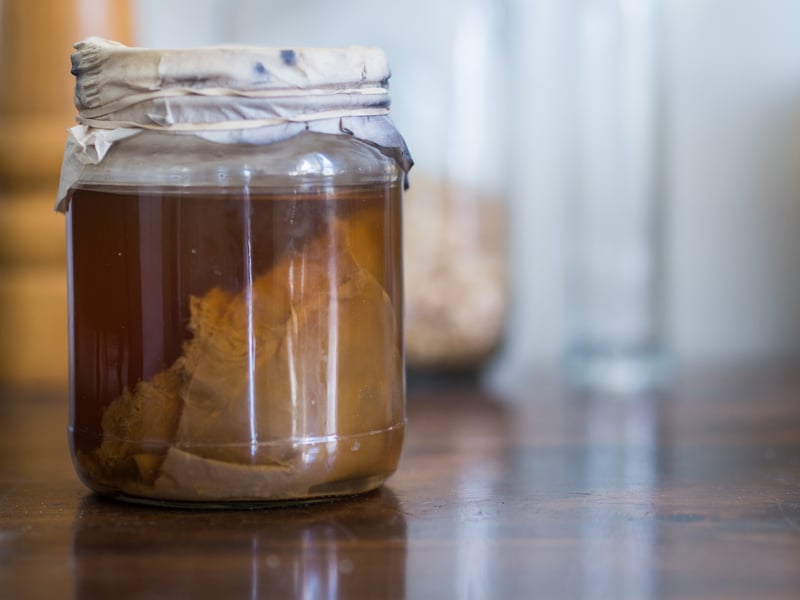Ask the Coaches: Are There Health Benefits of Kombucha Drinks?

Dear Coach,
I’ve been hearing a lot about kombucha tea lately, and I see quite a few different options at the market. What are the health benefits of kombucha? What’s your take—is it healthy? Or, is it hype?
-Nancy
Hey, Nancy! Thanks so much for sharing your questions. They’re great, and we’ll be happy to help.
As you alluded to, kombucha is everywhere. Depending on where you look or who you ask, you may quickly be swayed into believing this popular “superfood” is a panacea. On the other hand, you may have read that drinking kombucha can lead to negative effects, such as liver damage.
Even in scientific journals, kombucha is alternately praised as “the ultimate health drink” or damned as “unsafe medicinal tea.”1 As usual, the truth is probably somewhere in the middle of the two extremes.
The Health Benefits of Kombucha
For starters, kombucha is a fermented beverage made with tea (usually black), sugar, and a SCOBY, which is a complex, mutually supportive (symbiotic) colony of bacteria and yeasts. Because the SCOBY is a “tea fungus” formed during the fermentation process, kombucha is often referred to as “mushroom tea.”
It’s largely because of its probiotic content that kombucha is lauded for its potential health benefits. And, kombucha is a good source of several species of probiotics, including strains from the Lactobacillus, Acetobacter, Gluconobacter, Zygosaccharomyces, Saccharomyces, Saccharomycodes, and Brettanomyces families.
As you may be familiar, probiotics are friendly bacteria that can help us stay healthy, support a healthy digestive tract, aid in digestion and absorption, keep harmful microbes at bay, and support a healthy balance of gut bacteria, which can be challenged by stress, poor diet, antibiotics, over-the-counter medications, traveling, aging, environmental toxins, smoking, alcohol, and more.
In addition, research has shown that kombucha has antibacterial and antioxidant activity, and it may also help support the immune system. What’s more, kombucha has been purported to:1
- Promote liver function
- Stimulate the immune system
- Promote detoxification
- Balance gut bacteria
- Improve hair, skin, and nail health
- Ease stress
- Counteract aging
- Enhance metabolism
- Regulate appetite
- Reduce body fat
The Downside to Kombucha?
Having said that, it’s important to note that there are very few randomized controlled trials that support these health claims (some of which are very far-reaching) or those touted by many health companies and Internet bloggers. I’ll be the first in line to tell you that many of these proposed benefits are overstated.
In a systematic review of the scientific research, Dr. Edzard Ernst found no clinical studies demonstrating that kombucha was an effective “remedy.” Dr. Ernst concluded, “On the basis of these data it was concluded that the largely undetermined benefits do not outweigh the documented risks of kombucha. It can therefore not be recommended for therapeutic use.”2
On the other hand, in a more recently published review, researchers from the University of Latvia concluded that, based on its detoxification, antioxidant, energizing, and immunity properties, kombucha is “attractive as a fermented functional beverage for health prophylaxis,” which is medical terminology for a preventive action.3 It’s important to point out that this conclusion is not based on any actual human clinical trials.
Having said that, when we’re attempting to consider the totality of the “evidence,” we should take into account real-world experience as well. In other words, we can’t completely ignore feedback from individuals. We just have to take it with a grain of salt and view it as objectively as we can.
For instance, the B vitamin content of kombucha is frequently cited as a benefit. While kombucha does indeed contain trace amounts of several B vitamins, it is not a significant source of any of them.
Of course, kombucha is not for everyone. For many, the vinegary, acidic taste is unbearable, and the floating particles (of fungus) are stomach-churning. What’s more, commercially available kombucha can be expensive to drink daily. There’s the homebrew alternative. However, because it is unpasteurized and often prepared in unsterile conditions, there is an increased likelihood for the growth of unhealthy microbes.
Despite the onslaught of purported health benefits of kombucha, there is some evidence (i.e., case studies) of toxicity and adverse events (e.g., liver damage, metabolic acidosis) associated with kombucha consumption.2 In addition, there are reports of dizziness and nausea after kombucha consumption, and there are case studies where kombucha has been found to cause lead poisoning and gastrointestinal toxicity. It’s also worth noting that kombucha is contraindicated in pregnant and lactating women.1
In general, the negative case studies and adverse reports appear to primarily be related to homebrew kombucha and/or to folks who are immunocompromised (e.g., HIV patients). It’s also important to point out that toxicity reports are “rare and scattered.” And for what it’s worth, the United States Food and Drug Administration (FDA) considers kombucha safe for human consumption.
The Health Benefits of Kombucha Tea: The Verdict
Having said all that, the fact is there is currently no published evidence on the biological activities or health benefits of kombucha tea in human trials. So, while it may indeed be regarded as a “health” beverage—known to contain health-promoting probiotics and antioxidants—at this stage in the game, the bold claims seem to be overstated.
That’s not to say that kombucha can’t be included as part of an overall healthy diet. It can indeed, and if you do, it may be best to stick with commercial kombucha preparations (which are pasteurized and sterile) and to limit your consumption to a conservative amount (e.g., 4 – 8 ounces).
What’s more, I think it’s important that we always come back to the fact that there’s not a single food (a “magic bullet” or “superfood,” so to speak) that is likely to be the “key” or “missing link” to your health and fitness goals. Rather, it’s about your entire body of nutrition work and a consistent commitment to an overall healthy lifestyle that all add up to yield the desired end product.
I hope you find this to be helpful, Nancy. I’d love to hear your feedback, as well as your experiences with kombucha. Thank you!
-Coach Tim







